“MindMotion·Star“ Series: Major Member MM32F5260 Officially in Mass Production
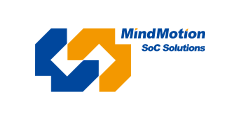
At the Shenzhen Elexcon 2024 in late August, MindMotion Microelectronics officially unveiled the “MindMotion·Star” series of high-performance MM32 MCU products, featuring four sub-series: MM32F3, MindMotion Dubhe MM32F5, MindMotion Alioth MM32G5, and MindMotion Phecda MM32H5.
Today, we are excited to announce the formal launch of a key member of the MindMotion Dubhe sub-series: the MM32F5260.
Key Features of MM32F5260
1. Powerful Domestic Star-MC1 Core
The MM32F5260 is powered by the Star-MC1 core licensed from Arm China, based on the Armv8-M architecture. With instruction set compatibility with the Cortex-M33, it delivers a 20% performance improvement over traditional Arm Cortex-M3/M4 cores, achieving 1.5 DMIPS/MHz and 4.02 CoreMark/MHz. It includes a single-precision floating-point unit (FPU), DSP extensions, and advanced L1 I-Cache & D-Cache, as well as I-TCM & D-TCM for enhanced core performance.
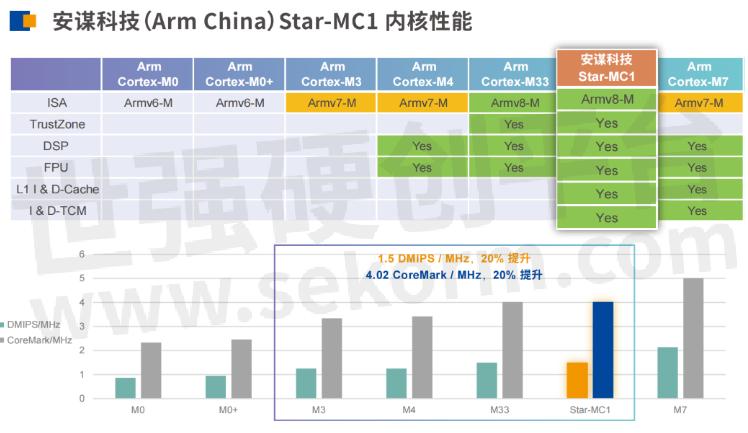
2. Fully Domestic Supply Chain
The MM32F5260 utilizes a completely domestic supply chain and reliable embedded eFlash technology, meeting the high-reliability requirements of applications in home appliances and industrial sectors.
3. Rich Storage, Communication, and Analog Resources
The MM32F5260 offers 256KB of flash memory and 128KB of RAM, supporting FSMC and XIP Quad-SPI interfaces. It features 14 communication interfaces, including 2 FlexCAN interfaces, and 2 x 3Msps 12-bit ADCs, 2 x 12-bit DACs, and 3 analog comparators.
Major Characteristics of MM32F5260
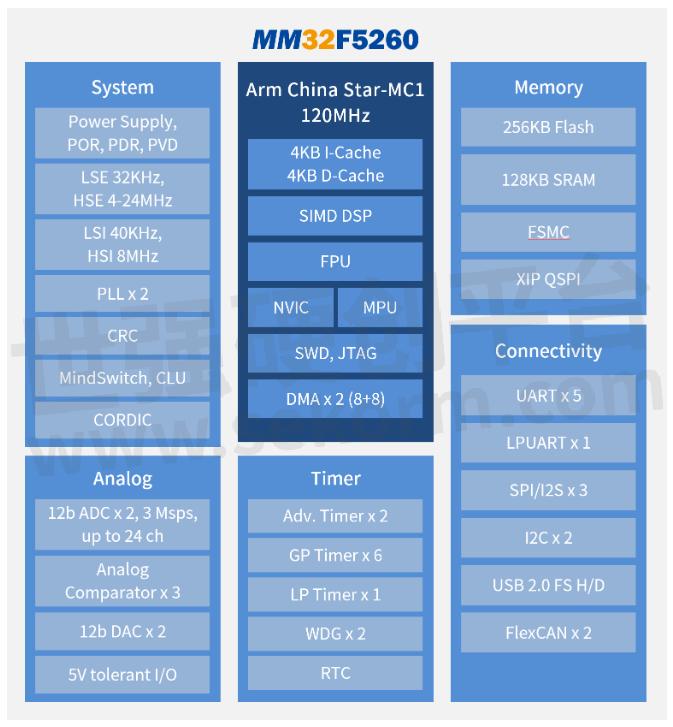
Core and System
- Operating frequency up to 120MHz
- STAR-MC1 processor (Cortex-M33 compatible) based on Arm®v8-M Mainline architecture
- 4KB L1 instruction cache and 4KB L1 data cache
- CORDIC (Coordinate Rotation Digital Computer) for trigonometric function acceleration, supporting Sin, Cos, and Atan operations.
- MindSwitch Peripheral Interconnect Matrix, enabling direct or triggered connections between signals of modules such as timers, GPIOs, EXTI, ADC, DAC, and comparators.
- Two 8-channel DMA controllers, supporting peripherals including timers, ADC, DAC, UART, LPUART, I2C, SPI, QSPI, and FlexCAN.
Memory
- Up to 256KB of Flash memory
- Up to 128KB of SRAM
- Bootloader for in-system programming (ISP)
- QSPI interface, supporting external NOR Flash memory expansion and eXecute-In-Place (XIP) mode.
- FSMC interface, accommodating external SRAM/PSRAM/NOR Flash types, compatible with 8080/6800 communication bus modes.
Clock, Reset, and Power Management
- Operating voltage: 2.0V to 5.5V
- Power-on/Pull-down reset and programmable voltage detector
- External high-speed crystal oscillator ranging from 4 to 24 MHz.
- Built-in factory-calibrated 8 MHz high-speed RC oscillator.
- Integrated PLL1 for generating the system clock, supporting multiple division modes to provide clock signals for the bus matrix and peripherals.
- Integrated PLL2 capable of producing system clocks up to 100 MHz, supporting various division modes for USB and ADC clocking.
- Built-in 40 kHz low-speed oscillator.
- External 32.768 kHz low-speed oscillator, supporting bypass functionality.
Low Power Modes
- Multiple low-power modes, including: Lower Power Run, Sleep, Low Power Sleep, Stop, Deep Stop, and Standby.
- VBAT powers the RTC and backup registers (20 x 16 bits).
- Built-in LPUART and LPTimer, enabling wake-up triggers from low-power modes.
Up to 14 Communication Interfaces
- 5 UART interfaces
- 1 LPUART interface
- 2 I2C interfaces
- 3 SPI interfaces, supporting I²S mode
- 1 USB 2.0 interface, supporting Device & Host modes
- 2 FlexCAN interfaces, compatible with CAN 2.0B protocol
13 Timers
- 2 16-bit 4-channel advanced timers (TIM1 / TIM8) with 4 sets of PWM output channels that include complementary output features and support for hardware dead-time insertion and emergency stop functions after fault detection.
- 2 16-bit 4-channel general-purpose timers (TIM3 / TIM4) and 2 32-bit 4-channel general-purpose timers (TIM2 / TIM5), each channel featuring 1 PWM output and supporting input capture and output comparison, suitable for decoding infrared, Hall sensor, or encoder signals.
- 2 16-bit basic timers (TIM6 / TIM7) for general timing and interrupt generation.
- 1 16-bit low-power timer (LPTIM) capable of waking the processor in all low-power modes except Standby.
- 2 watchdog timers, including an independent IWDG and a windowed WWDG.
- 1 24-bit Systick timer.
- 1 RTC (Real-Time Clock)
2 12-bit ADCs, supporting 19 external input channels and 2 internal input channels, with a maximum conversion rate of 3 MSPS and hardware support for oversampling up to 16-bit resolution.
- Conversion range: 0 to VDDA.
- Supports sampling time and resolution configuration.
- Supports hardware oversampling, with selectable oversampling counts from 2 to 256.
- On-chip temperature sensor.
- On-chip voltage sensor.
- VBAT voltage sensor.
2 12-bit DACs.
3 high-speed analog comparators.
Up to 86 fast I/O ports:
- All I/O ports can be mapped to 16 external interrupts.
- All ports can input and output signals not exceeding VDD.
- Up to 61 5V-tolerant I/O ports
CRC Calculation Unit
96-bit Unique Chip ID (UID)
Debugging Mode
- Serial debug interface (SWD).
- JTAG interface.
Available in LQFP100, LQFP64, and LQFP48 packages.
Supports an extended industrial operating temperature range of -40℃ to +105℃.
MM32F5260 Product Portfolio
The MM32F5260 is available in LQFP48, LQFP64, and LQFP100 packages, providing an extended industrial-grade operating temperature option from -40 to +105°C. Three models are launched this time, details are as follows:
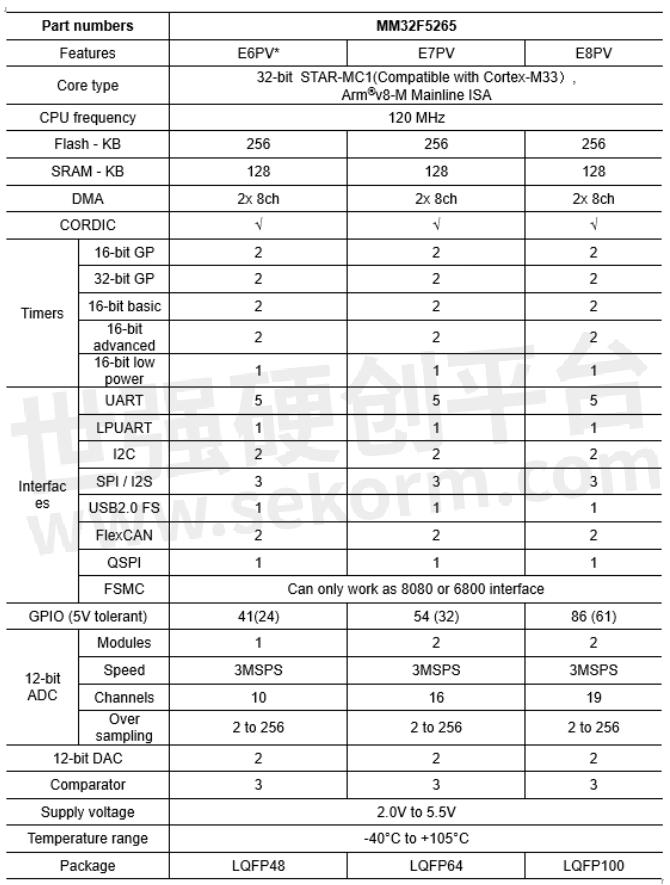
Applications of MM32F5260
Smart Industry
- Industrial control
- Elevator control
- Fire control
- Transportation
Smart Home Appliances
- Printers
- Scanners
- Appliance control
- Motor control
- Floor cleaning machines
- Robotic vacuums
Development Tools for MM32F5260
The MiniBoard-OB development board for the MM32F5260 will be launching soon:
Mini-F5265-OB
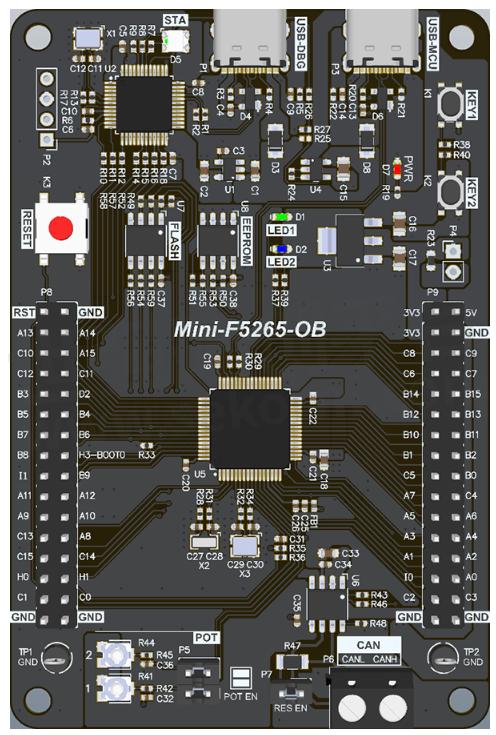
Onboard Main Controller: MM32F5265E7PV
Onboard Resources:
- 2 User LEDs
- 2 User Buttons
- 1 Reset Button
- 1 Adjustable Potentiometer
- 8M SPI FLASH and 2K EEPROM
Onboard Interfaces:
- 1 x USB Type-C (USB-DBG)
Power Supply:
- USB TYPE-C
EVB-F5265
The MM32F5260 will also support an EVB (as shown below), which is currently in development and expected to be completed by November this year.
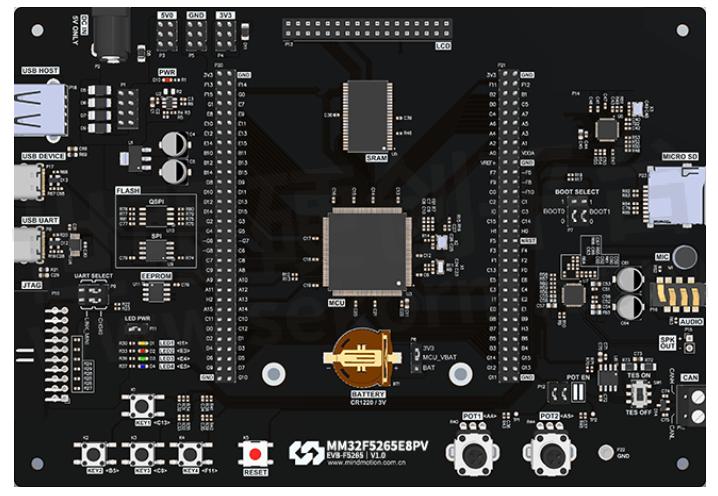
Onboard Main Control: MM32F5265E8PV
Onboard Interfaces:
- USB:
-- USB Device/Host (for target chip USB)
-- USB to UART (for serial printing/debugging)
- JTAG-20P debugging port
- 3.5mm audio jack
- 1x2P speaker output (8Ω, 1W)
- CAN interface
- 2x17Pin LCD interface (8080 interface, default configured for 320x480 resolution display)
- DC power input (5V)
- MicroSD card slot
Onboard Resources:
- 4 user LEDs
- 4 user buttons
- 1 reset button
- 2Kbit EEPROM
- 32Mbit Flash
- 8Mbit SRAM
- 2 potentiometers
- CAN transceiver
- Audio codec (with one onboard microphone input)
Power Supply:
- Type-C interface
- DC power input
- JTAG-20P debugging port
MM32-LINK MINI
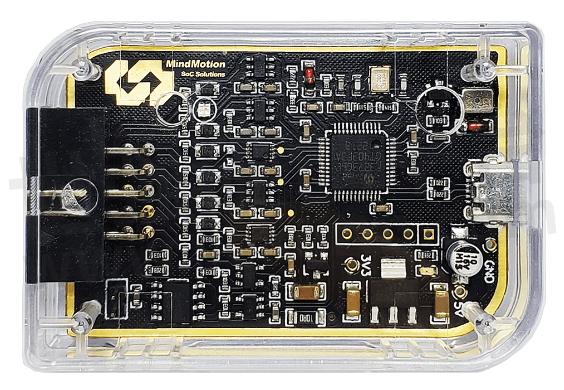
- Supports MM32 MCU SWD programming and debugging, compatible with CMSIS-DAP debugging channel
- Supports CDC virtual serial port, accommodating common baud rates
LibSamples
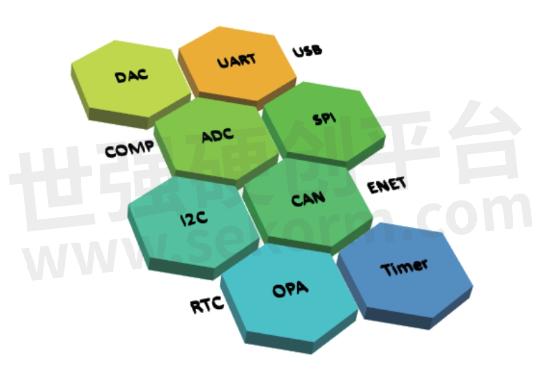
Independent libraries and examples are organized by module, with LibSamples listed on each product page.
The MM32F5260 is now fully supported with complete samples, development boards, and software development kits.
The MM32F5260 series is in full production and open for large volume orders.
- +1 Like
- Add to Favorites
Recommend
This document is provided by Sekorm Platform for VIP exclusive service. The copyright is owned by Sekorm. Without authorization, any medias, websites or individual are not allowed to reprint. When authorizing the reprint, the link of www.sekorm.com must be indicated.

































































































































































































































































































































































































































































































































































































































































































































































































































































































